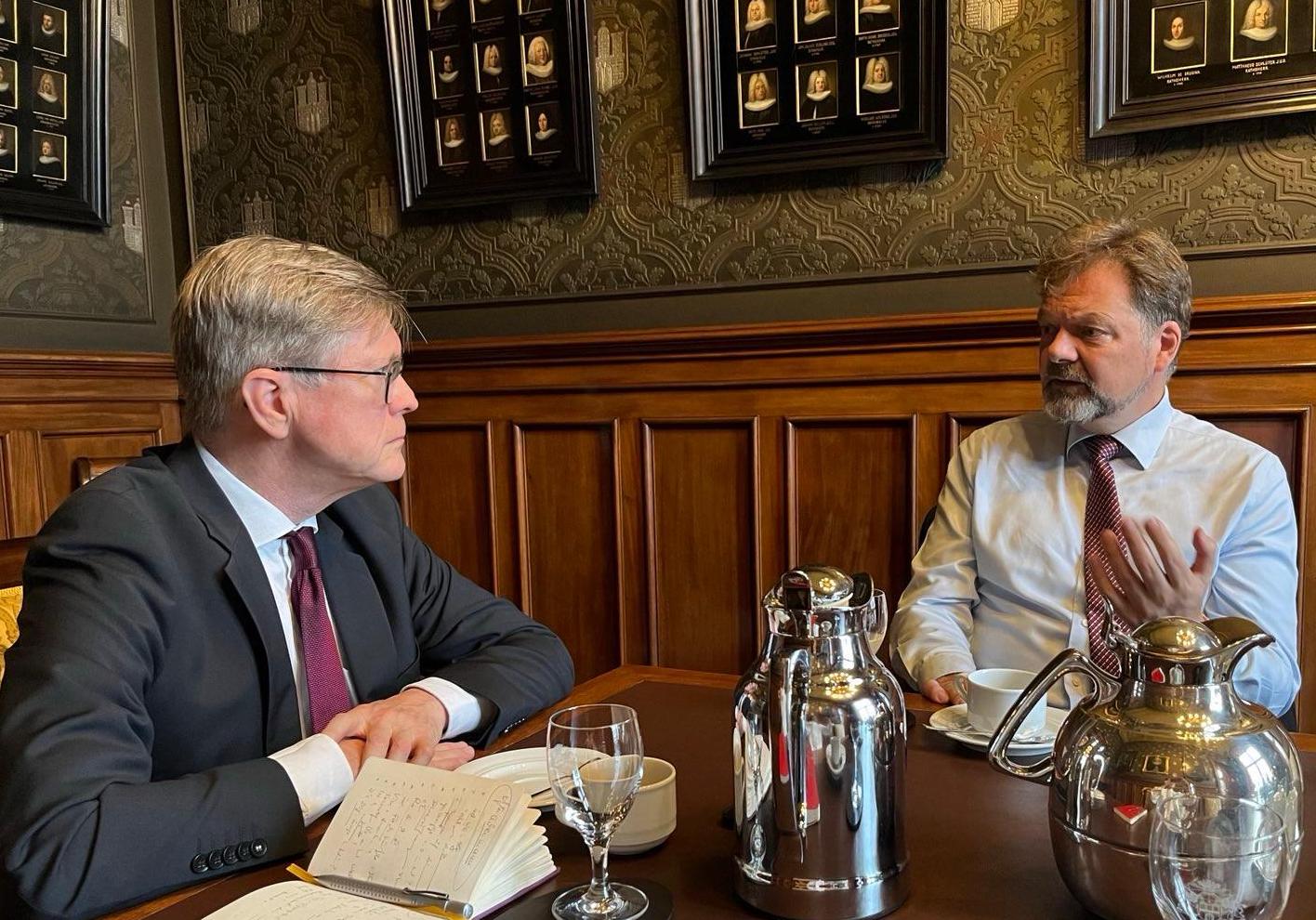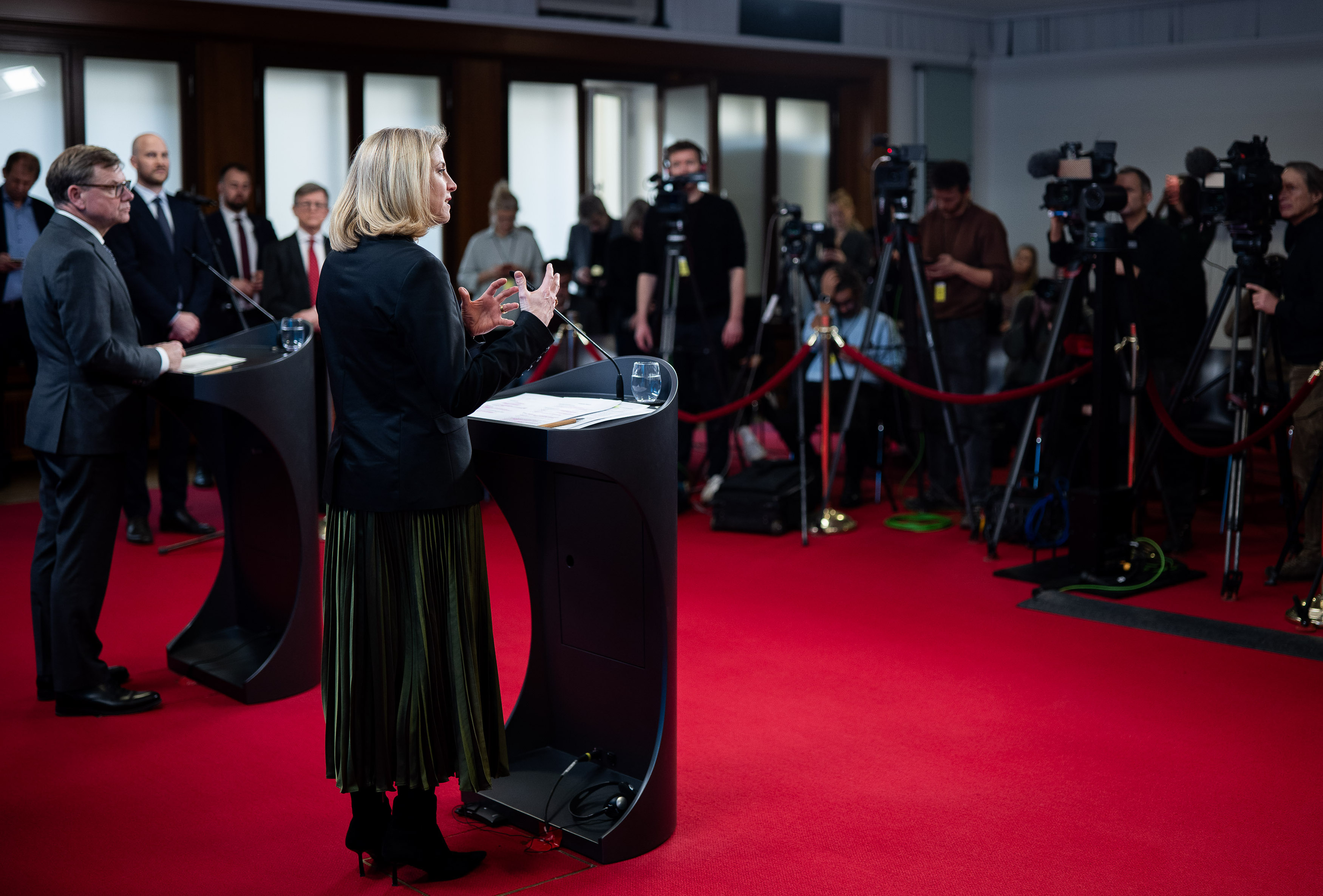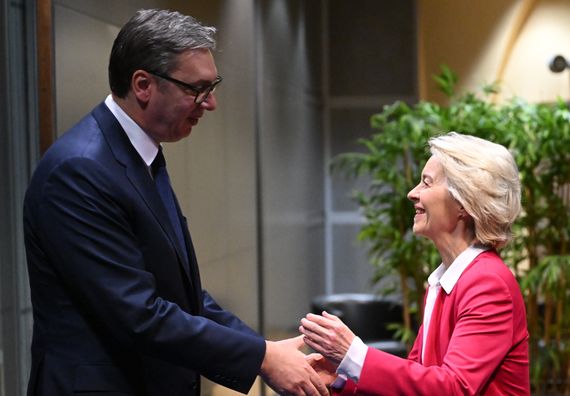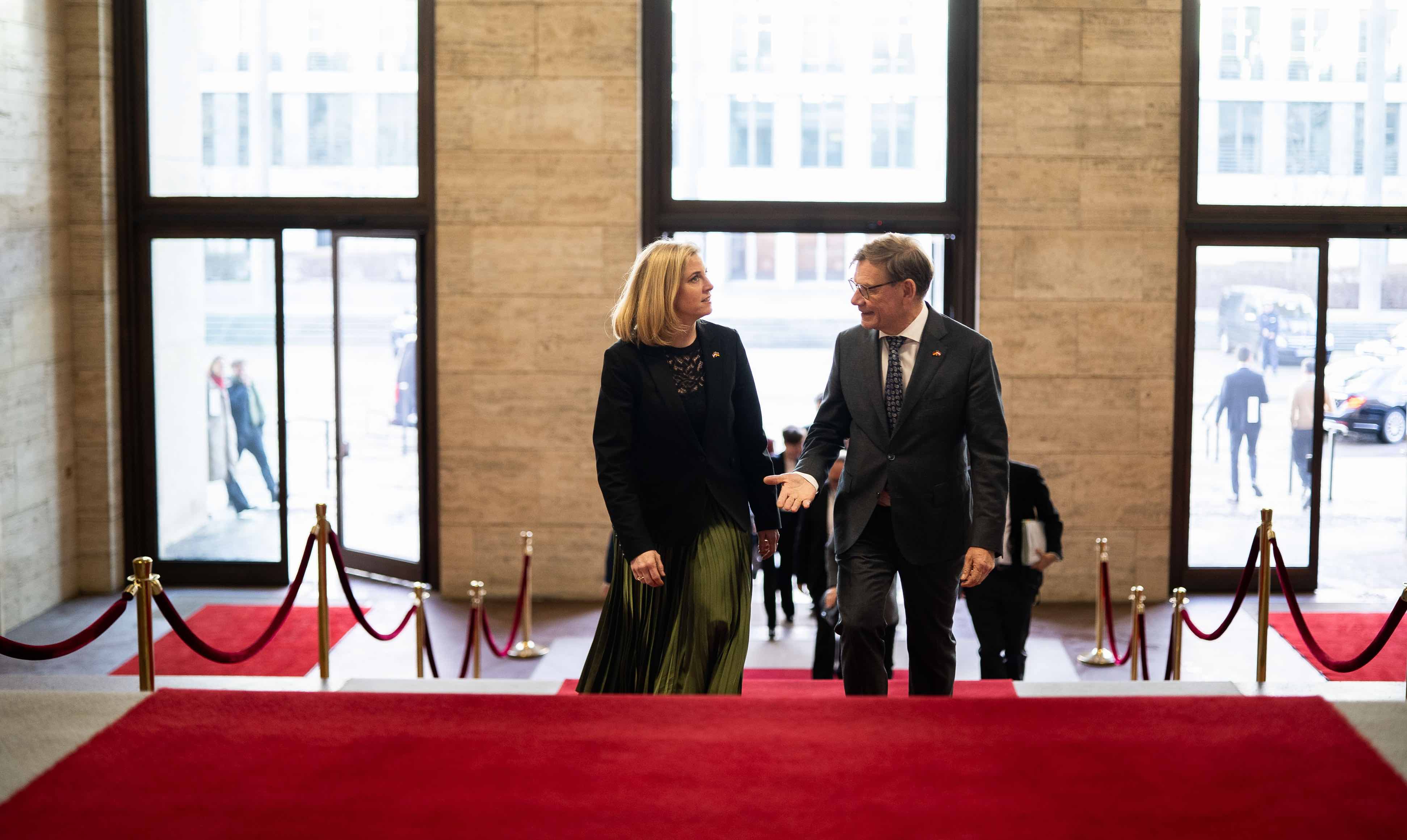diplo.news
“Germany doesn't understand India enough — yet it is our most important partner of tomorrow”
Interview by Ewald König

The most populous country in the world has the most solid economic growth. However, there is often too little expertise on India in Germany. With 50,000 students, India has the largest non-German student group at German universities; thanks to Donald Trump's visa policy, the number is increasing by leaps and bounds. Germany's ambassador in New Delhi, Philipp Ackermann, explains Indian pragmatism, dynamic arms cooperation and why bilateral relations have never been as good as they are now and how India is becoming one of the most important partners.
In Germany, it is striking how many IT professionals come from India. In general, Indian migration to Germany is strong. Why is that?
Most Indians works here in the care sector, as nurses and geriatric nurses. They are currently being massively recruited from India. Many come from states such as Kerala or Telangana. 20 percent of Kerala's population works abroad, most in health professions. There are also IT professionals, but in smaller numbers. There are also many trainees — for example in the bakery, butcher or roofing trade, as mechanics and bus drivers. Germany urgently needs these specialists.
Is this immigration actively promoted by the German side?
Yes, we have programs to bring German language skills to the required level. Because in the care sector, you can't do without German, unlike in the IT sector. The cooperation is going well, but the demand is bigger, therefore we need a lot more.
Doesn't the visa process always cause problems here?
Not with us, at least not with skilled workers — the process is largely digitized via the international portal. There are only bottlenecks with short-term visas in summer because many Indians want to escape the heat and travel to Europe. You need around eight weeks in advance to make an appointment for a Schengen visa. But this is a seasonal phenomenon. In winter, one day is enough.
What problems are you dealing with in bilateral relations?
Overall, Indo-German relations are as good and close as they have ever been!
There are occasional minor frictions in this close relationship. But that also happens with France. Relations are so intensive because they take place on many levels - now even in the area of defense. Germany is conducting more and more exercises with India, such as joint air force exercises with tens of German aircraft. That was impressive. We are even strengthening our military staff. This is a new dimension of armaments policy and military cooperation between the armed forces.
Doesn't that make the Chinese nervous? Will they intervene?
No We wouldn't put up with that either. That is our sovereign decision.
What is the volume of arms deliveries?
We certainly have a certain arms presence in India. The most interesting is the submarine deal with ThyssenKrupp Marine Systems (TKMS), where the decision in India will be made in the next few months. But there are also Indian offers available to us. The Indian market with a highly differentiated, partly privatized defense industry is definitely interesting for us.
Are language courses not affected by German austerity measures, particularly at the Goethe-Institut?
Not at all. In India, we have six Goethe Institutes and four Goethe Centers, which together now take almost 200,000 German exams annually, and demand is extremely high. But the need is greater. That is why we are now trying to train even more German teachers in India. The Goethe-Institut is in a financially pleasant position due to the course and examination fees.
Many Indian students want to go to Germany. Is Germany benefiting from the new US restrictions on foreign students?
50,000 Indians study in Germany. This is the largest non-German group. It grows by around ten percent every year. In the first six months of this year alone, we received 35 percent more applications from Indian students at German universities. In fact, this is primarily due to the USA, where everything is becoming more difficult. There is suddenly a lot ahead of Germany.
But we must be careful. The quantity is impressive, but we must maintain the quality. In Berlin, Potsdam, Hamburg, there are a few “university-like” institutions that are not registered under German higher education law and advertise very aggressively on the Indian market. They are shifting our quality standards. Students come through placement agencies, some of which work with counterfeits, pay 8,000 euros per semester and therefore have to earn money as food suppliers. Students then receive degrees that do not meet German educational standards. There is no other country in Europe with so many Indian students, but it is in our interest to also pay attention to aptitude and course of study.
So Donald Trump's policies are working in Germany's favor?
We are currently intensively recruiting top people who are no longer considering steering the USA to Germany. The opportunities for Germany are good. Why do we think it's good that 50,000 Indian students are here? Because they are all potential workers who can stay in Germany. Between 50 and 70 percent of them stay. That's not a bad result, but we still need more top people. We are working on it.
How does this huge country view the current geopolitical situation?
India's main focus is clearly on the USA, which is its most important and at the same time most demanding partners. The customs dispute and ongoing talks about a trade agreement are particularly challenging - this is no walk in the park. India comes from a completely different economic policy tradition and has a different economic policy approach. It will be difficult for them to accept the demands of the USA. Yet the pressure is high. India sees itself as an emerging major power, the most populous country in the world with the most solid economic growth and with areas in which Indians are world-class, such as in digitalization and services. This self-perception is also defined by the partnership with the USA. But in addition to the USA, the biggest issue of all is, of course, China.
Is China a competitor or partner for India?
That is not so easy to answer. Many people in India have significant reservations about China. China is India's biggest foreign policy challenge, but at the same time it is also India's biggest trading partner.
India cannot simply ignore China. They need China, but they have a wide variety of conflicts, particularly on border issues. The border conflicts, particularly in the northeast, remain unresolved. The Indian government would not be opposed to a tough China policy, but it must also not be so harsh that it suffers from it and damages its own economy. An example: 90 percent of the generic drugs that we buy here in pharmacies come from India. But 90 percent of this is based on active ingredients from China. If supply chains are interrupted, India would have a huge problem. A trade war with China would definitely not be in India's interest.
Does India benefit from the rivalry between the USA and China?
Indirectly, yes. India is seen as an alternative — for production sites or energy relationships, for example. But India is careful. The government is pursuing a strictly multipolar course: not alliances, but bilateral relations with everyone.
How is India positioning itself in the Middle East conflict?
Officially, the Indian government is pro-Israel. It has great sympathy for Israel. Even in terms of armaments, there are close connections. However, the population is critical of Israel. So there is a discrepancy between what the government is saying and what the population feels.
Is there a risk of the Kashmir conflict escalating?
The latest military conflict lasted three and a half days. Relatively brief when you look at other crises... Both sides, India and Pakistan, were quick to calm the situation. They may not be moving towards each other, but it is remarkable that, following the Pahalgam attack in northern India, they both made it clear that they do not want a conflict.
The economic damage of an escalation would be too high. This quickly became clear to both of them when concerned entrepreneurs asked whether they should continue to invest here. But what could happen at any time is a new terrorist attack in Kashmir. This could change the situation suddenly.
India is obviously benefiting from sanctions against Russia and sells Russian energy to the sanctioned countries. How is this viewed in Delhi itself?
India is very pragmatic about this. Wherever cheap energy comes from, you take it. India has benefited greatly from Russian discounts - but as soon as the price went up, they pulled out again. Per capita energy consumption is low, as is per capita income. It is less than 3,000 US dollars a year. India says: We cannot expect our citizens to buy artificially expensive energy by buying it at a high price. You have to accept that. It's different with us.
It is clear that India is not supporting the sanctions against Russia.
What is India's biggest foreign policy concern right now?
China. The Sino-Indian border is not recognized by Beijing — in particular, the state of Arunachal Pradesh in the northeast is completely claimed by China. From an Indian perspective, this is a serious threat to territorial integrity. China is India's toughest geopolitical nut to crack.
And domestically?
Unemployment, definitely. India may have solid economic growth of six to seven percent, but that is not enough to get the many young people into employment. The birth rate has only been falling for a few years.
There are also structural problems, particularly agriculture: More than 50 percent of people in India work on small areas with which they cannot earn money. There were attempts at reform, but they failed due to resistance from the farmers. That won't work in the long run.
What is Germany's current image in India?
It's great. Indians think Germany is better than we Germans do. Classic German soft power, efficiency, technology and engineering, soccer and cars, all of this results in a good basic attitude towards Germany. It may be a bit dated, but it's still good to work with. An interesting network of Indian influencers accompanies students with their concerns and needs and provides a realistic picture of Germany, where people are often not in a good mood and the food doesn't taste good... The interaction in Germany is sometimes cooler, which is completely different than in India.
And vice versa: What image does India have among Germans?
There is clearly too little India expertise in Germany. You know far too little. That is why the Hamburg Senate's initiative with India Week is the best thing I know. In this way, you can bring the huge country, which is playing an increasingly important role, to the audience. It is phenomenal, the only event of this kind in Germany. We need to make more of an effort in Germany to capture the country better. Many other European countries are further ahead than we are.
India does not send a correspondent to Germany, and conversely there are hardly any German correspondents from India. Maybe that's why we know so little about each other?
Many people in Germany have an old, quite sympathetic image of India and think of dancing elephants and colorful traditional costumes. Yet India has 30 federal states with different governments and state parliaments and a very lively lower house of parliament, and little is written about it.




